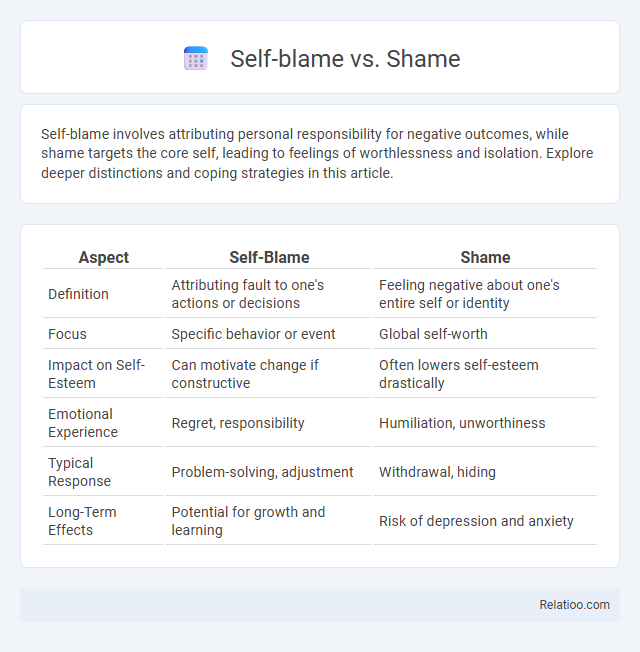Self-blame involves attributing personal responsibility for negative outcomes, while shame targets the core self, leading to feelings of worthlessness and isolation. Explore deeper distinctions and coping strategies in this article.
Table of Comparison
| Aspect | Self-Blame | Shame |
|---|---|---|
| Definition | Attributing fault to one's actions or decisions | Feeling negative about one's entire self or identity |
| Focus | Specific behavior or event | Global self-worth |
| Impact on Self-Esteem | Can motivate change if constructive | Often lowers self-esteem drastically |
| Emotional Experience | Regret, responsibility | Humiliation, unworthiness |
| Typical Response | Problem-solving, adjustment | Withdrawal, hiding |
| Long-Term Effects | Potential for growth and learning | Risk of depression and anxiety |
Understanding Self-Blame and Shame: Definitions
Understanding self-blame involves recognizing it as the tendency to hold yourself responsible for specific negative events or outcomes. Shame differs by targeting your entire self, causing feelings of worthlessness and a desire to hide or escape judgment. Your ability to differentiate self-blame from shame is key to fostering healthier emotional responses and improving overall mental well-being.
The Psychological Roots of Self-Blame
The psychological roots of self-blame are deeply embedded in cognitive patterns that misattribute personal responsibility for negative outcomes, often stemming from early experiences of criticism or neglect. Unlike shame, which is a painful feeling directed toward the self as a whole, self-blame specifically targets actions or decisions, creating a cycle of guilt and rumination. Understanding these distinctions is crucial for therapeutic approaches that aim to reframe maladaptive thought processes and promote self-compassion.
How Shame Manifests in Daily Life
Shame manifests in daily life through feelings of worthlessness, social withdrawal, and a persistent fear of judgment by others, deeply impacting Your self-esteem and interpersonal relationships. Unlike self-blame, which targets specific actions or mistakes, shame attacks the core self, causing emotional pain and internalized negativity that can lead to anxiety and depression. Recognizing these patterns can help differentiate between self-blame and shame, enabling more effective coping strategies and emotional healing.
Key Differences Between Self-Blame and Shame
Self-blame centers on attributing personal responsibility for a negative event, whereas shame involves a deep feeling that one's entire self is flawed or unworthy. You experience self-blame when evaluating specific actions, while shame affects your core identity and self-worth. Understanding these key differences helps in addressing emotional well-being more effectively.
Emotional Impact: Self-Blame Versus Shame
Shame primarily triggers feelings of worthlessness and a desire to hide, while self-blame focuses on attributing fault to oneself for specific actions, leading to guilt and potential motivation for change. Emotional impact from shame often results in intense withdrawal and low self-esteem, whereas self-blame may promote reflection but can also cause rumination and anxiety if excessive. Differentiating between the two is crucial for effective emotional regulation and therapeutic interventions.
Triggers of Self-Blame and Shame
Self-blame often arises from personal accountability for specific actions or mistakes, triggered by internal reflections on perceived failings. Shame is typically triggered by a pervasive sense of worthlessness or judgment from others, rooted in identity rather than behavior. Understanding these distinct triggers helps differentiate self-blame's focus on behavior from shame's impact on self-worth.
The Role of Childhood Experiences
Childhood experiences significantly influence the development of self-blame and shame, often shaping how individuals internalize responsibility for negative events. Abuse, neglect, or inconsistent caregiving can lead to heightened feelings of shame, where individuals perceive their entire self as flawed, while self-blame tends to target specific behaviors or actions linked to perceived failures. Understanding these distinctions is crucial for clinical interventions aimed at addressing trauma-related patterns rooted in early attachment and emotional validation.
Coping Mechanisms for Self-Blame and Shame
Self-blame and shame are distinct emotional experiences where self-blame targets specific actions or mistakes, while shame affects your entire self-worth. Effective coping mechanisms for self-blame include cognitive restructuring, which challenges negative thoughts, and practicing self-compassion to foster emotional resilience. Managing shame involves building social support, engaging in mindfulness techniques, and seeking therapeutic interventions to restore a healthier self-image.
Breaking the Cycle: Healing Strategies
Breaking the cycle of self-blame and shame involves recognizing their distinct emotional impacts and addressing them with tailored healing strategies. Cognitive-behavioral techniques help challenge negative thought patterns, while mindfulness practices foster self-compassion and emotional regulation. Integrating therapy focused on self-forgiveness and developing healthier self-perceptions accelerates recovery and promotes lasting emotional resilience.
Seeking Professional Help: When to Get Support
Recognizing the difference between self-blame, shame, and guilt is crucial when deciding if you need professional help, as persistent self-blame and overwhelming shame can significantly impact your mental health. If your feelings interfere with daily functioning, relationships, or cause chronic anxiety or depression, consulting a licensed therapist or counselor can provide tailored strategies for emotional regulation and cognitive restructuring. Early support from a mental health professional facilitates healthier coping mechanisms and prevents further psychological distress.

Infographic: Self-blame vs Shame
 relatioo.com
relatioo.com